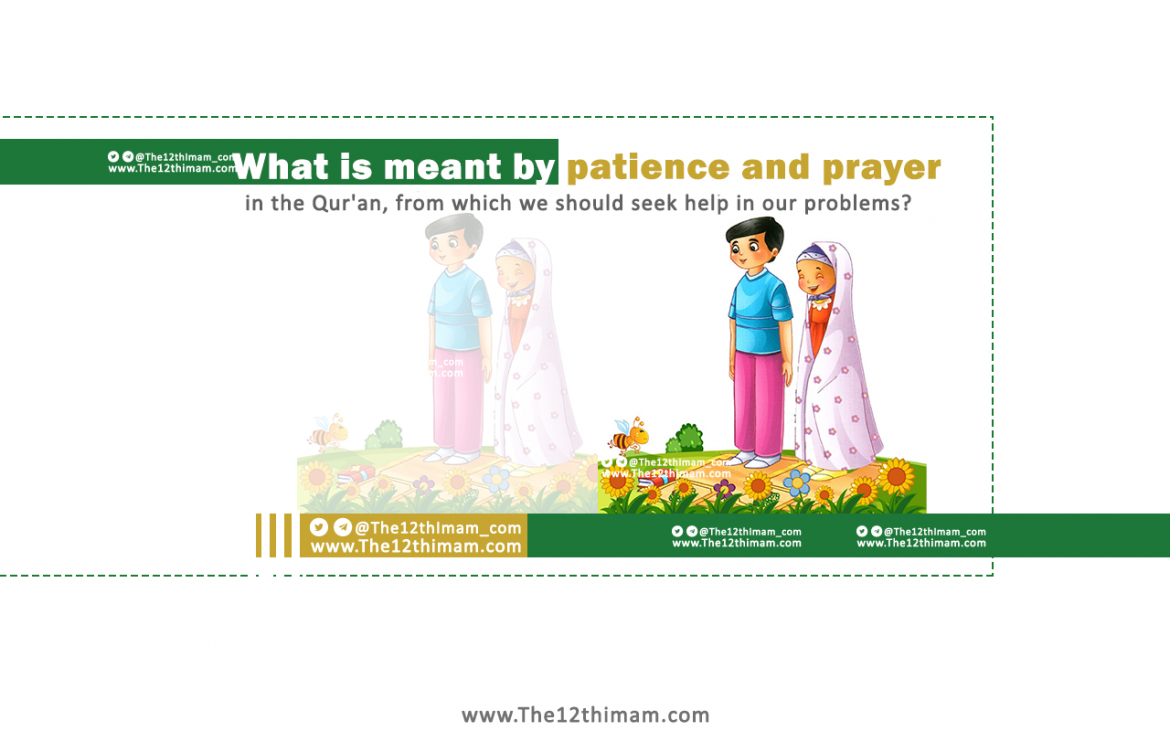In order for a person to be able to overcome his spiritual and worldly problems and to drive them out of his heart, the Holy Qur’an says:
” وَ اسْتَعینُوا بِالصَّبْرِ وَ الصَّلاةِ وَ إِنَّها لَکَبِیرَةٌ إِلَّا عَلَى الْخاشِعِینَ”
And seek help in patience and As-Salat (the prayer), and truly it is extremely heavy and hard except for Al-Khashi’un [i.e. the true believers in Allah – those who obey Allah with full submission, fear much from His Punishment, and believe in His Promise (Paradise, etc.) and in His Warnings (Hell, etc.)].” [1]
Since the Qur’an is an inner meaning and the verses of the Qur’an have both an outward and an inner meaning, we decided to examine and explain the inner meaning of this verse, which is very important.
The word “seeking help” means invoking, and this happens when human power all alone cannot do a great task or an incident having occurred at its own discretion. That God said: take recourse in patience and prayer for your ammunition and accidents, is because, in reality, there is no helper except God the Almighty, and it is Him who is the helper of man in difficult affairs and events. He is the one who helps man to persevere, connect his relationship with God, notice Him sincerely, and turned towards Him. And this is patience and prayer, and these two are the best means for victory, because patience makes every calamity or great accident diminutive and insignificant, and prayer, which is turning to God and seeking refuge in Him, revives the spirit of faith, and makes a person understand that he is relying on a place that is perishable and he is touched for a reason that cannot be torn.[2]
Of course, in some narrations, “patience” has been interpreted as “fasting”; That is, take help from fasting and prayer.[3]
But the most important referent of this is the guardianship of the Ahl-ul-Bait. Here we refer to a narration where Salman says, I said to Ali (pbuh), the first successor of the Prophet: O brother of the Messenger of Allah (PBUH)! God bless you! Is the intention of offering prayers the same as offering your Wilayah (governorship)? Imam said: Yes, O Salman. And the proof of that is the words of God Almighty in the Qur’an “And seek help in patience and As-Salat (the prayer) and truly it is extremely heavy and hard except for Al-Khashi’un [4] Based on this, “Patience” is the Prophet (PBUH), and “Prayer” is the inductility of my Wilayah. And because of this, God said (with the singular pronoun): “and it is extremely heavy and hard” and did not say (with the plural pronoun): “and they are extremely heavy and hard.” Because the acceptance of the governorship is heavy, except for the humble, and the humble are also the visionary Shiites.[5]
It means that the pronoun (ha ها) is singular, which goes back to the word Salat and shows that accepting the guardianship of Imam Ali, which is the inner meaning of prayer, is heavy (if you pay attention to the cults of Islam, you will notice the weight of accepting the guardianship of the Ahl-ul-Bait but Twelver Shīʿism (Arabic: ٱثْنَا عَشَرِيَّة ; ʾIthnā ʿAšariyya), also known as Imāmiyya (Arabic: إِمَامِيَّة)).
And only the Khashi’un, whose inner meaning is the Imāmiyya, for them, the guardianship is not burdensome and acceptable. Therefore, according to the above esoteric meaning, in order to seek help from God, we should make the Prophet of Islam, Imam Ali and the Ahl-ul-Bait intercessors, and we should ask God to help us for the sake of the Prophet and the Ahl-ul-Bait, and we should ask the Prophet and the Ahl-ul-Bait to pray for us that we may be relieved of our problems.
It goes without saying that this interpretation is an esoteric interpretation and does not mean that accepting the guardianship of the Ahl-ul-Bayt (pbut) can be a substitute for prayer and an excuse for abandoning it, for Imam Ali (pbuh) prayed through appeal of this verse: It means praying, which has the same outward meaning and admission to guardianship of Imam Ali and his eleven children should be together.
1. Surah Baqarah, verse 45. English Translation of the Meanings by Muhammad Taqi-ul-Din al-Hilali
2. Tabataba’I, Muhammad Hussain, Tafsir al-Mizan, volume 1, p. 152, Qum, entesharateeslami, fifth edition, 1417 A.H.
3. For example: “On the authority of Abdullah ibn Talha, on the authority of Abi Abdullah, peace be upon him [in the saying of the Almighty], “And seek help in patience and prayer.” He said:“Patience is fasting.” Ayashi, Mohammad Bin Masood, al-Tafsir, Mohaqeq, corrector, Rasooli Mahallati, Hashim, vol. 1, p. 43, Tehran, Al-Mattaba Al-A`lamiya, first edition, 1380 A.H.
4. Surah Baqarah. Verse 45.
5. Alavi, Muhammad bin Ali bin Al-Hussein, al-Manaqib (Al-Kitab al-Atiq), researcher, corrector, Mousavi Borujerdi, Hossein, pp. 69-70, Qom, Dilil Ma, first edition, 1428 AH; Majlisi, Muhammad Baqir, Bihar al-Anwar, vol. 26, p. 2, Beirut, Dar Ihya-ul-Trath-ul-Arabi, second edition, 1403 AH. Islamquest.



